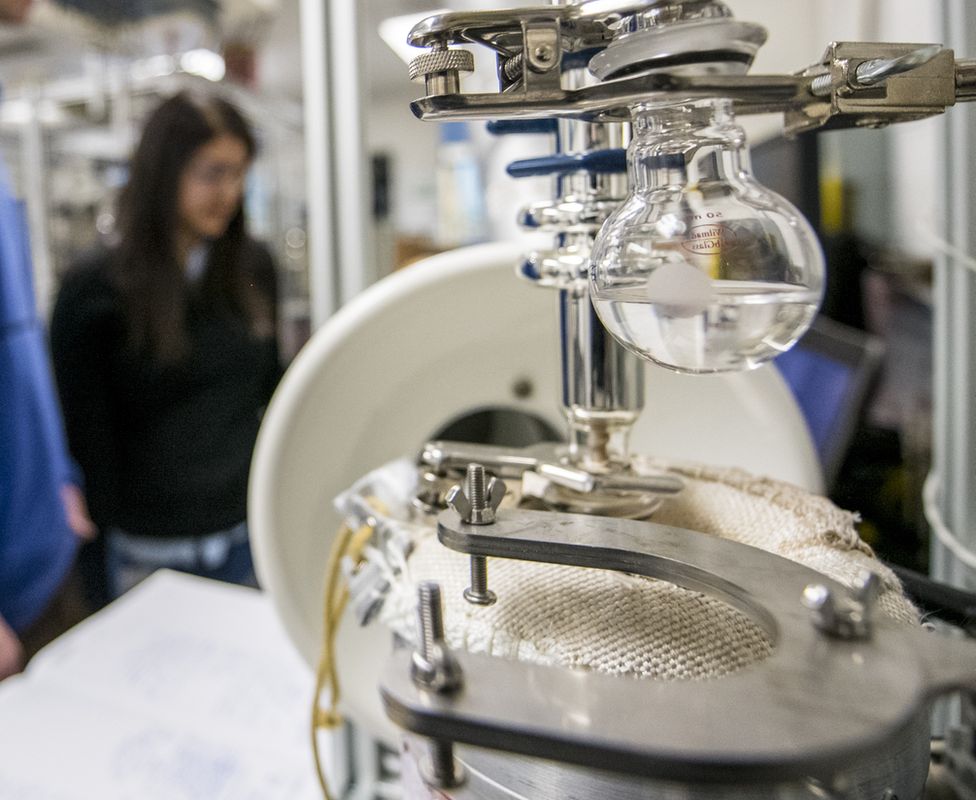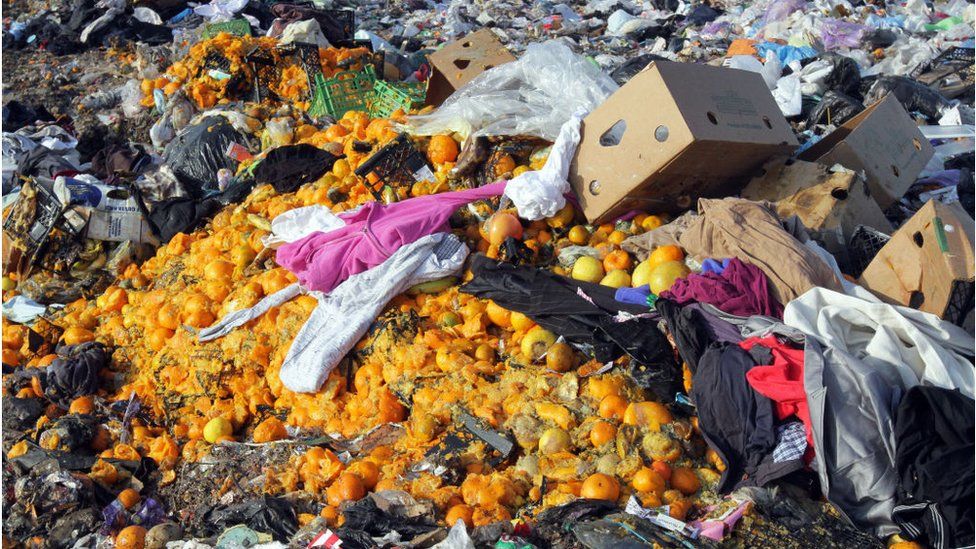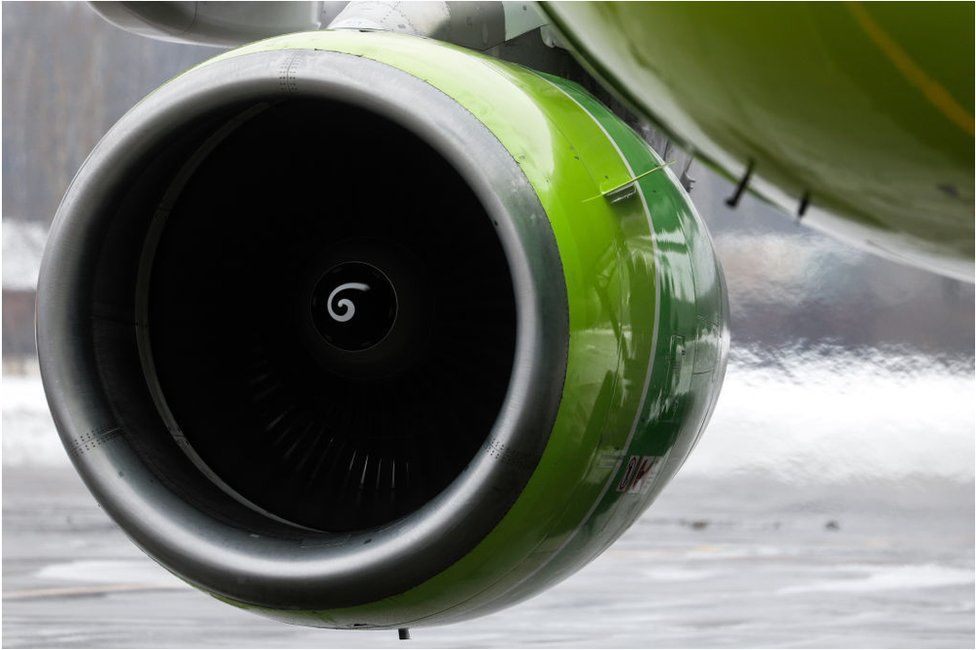Climate change: Jet fuel from waste 'dramatically lowers' emissions
A new approach to making jet fuel from food waste has the potential to massively reduce carbon emissions from flying, scientists say.
Currently, most of the food scraps that are used for energy around the world are converted into methane gas.
But researchers in the US have found a way of turning this waste into a type of paraffin that works in jet engines.
The authors of the new study say the fuel cuts greenhouse gas emissions by 165% compared to fossil energy.
This figure comes from the reduction in carbon emitted from airplanes plus the emissions that are avoided when food waste is diverted from landfill.
The aviation industry worldwide is facing some difficult decisions about how to combine increased demand for flying with the need to rapidly cut emissions from the sector.
 Researchers at the NREL lab in the US distilling the new fuel. Source NREL[/caption]
Researchers at the NREL lab in the US distilling the new fuel. Source NREL[/caption]
In the US, airlines currently use around 21 billion gallons of jet fuel every year, with demand expected to double by the middle of the century. At the same time, they have committed to cutting CO2 by 50%.
With the development of battery-powered airplanes for long haul flights a distant prospect at this point, much attention has focussed on replacing existing jet fuel with a sustainable alternative.
In fact the UK government has just announced a £15m competition to encourage companies to develop jet fuel from household waste products.
Making paraffin from wet-waste
Current methods of making green jet fuel are based on a similar approach to making biodiesel for cars and heavy goods vehicles.
It normally requires the use of virgin vegetable oils as well as waste fats, oil and grease to make the synthetic fuel.
At present, it is more economical to convert these oils and wastes into diesel as opposed to jet fuel - which requires an extra step in the process, driving up costs.
Now, researchers say that they have developed an alternative method able to turn food waste, animal manure and waste water into a competitive jet hydrocarbon.
Much of this material, termed wet-waste, is at present is turned into methane gas. However, the authors found a way of interrupting this process so it produced volatile fatty acids (VFA) instead of CH4.
The researchers were then able to use a form of catalytic conversion to upgrade the VFA to two different forms of sustainable paraffin.
 Food waste is a global problem and a major cause of global warming emissions. Source GETTY IMAGES[/caption]
Food waste is a global problem and a major cause of global warming emissions. Source GETTY IMAGES[/caption]
When the two forms were combined they were able to blend 70% of the mixture with regular jet fuel, while still meeting the extremely strict quality criteria that Federal authorities impose on aircraft fuels.
"There's exciting jet fuels that rely on burning trash and dry waste but this actually works for those wastes that have high water content, which we normally dispose of in landfill," said Derek Vardon, a senior research engineer at the US National Renewable Energy Laboratory and the lead author on the study.
"Being able to show that you can take these volatile fatty acids, and that there's a really elegant, simple way to turn it into jet fuel - that's where I see the broader applicability of this one, and folks can continue to develop and refine it."
The new fuel has a potentially significant impact on emissions as it not only limits the CO2 that comes from fossil sources used by the airlines, but it also gets rid of the methane that would bubble up from landfill if the waste food was just dumped.
Another major advantage is that this new fuel produces around 34% less soot than current standards. This is important because soot plays a key role in the formation of contrails from airplanes which adds a powerful warming effect to CO2 coming from the engines.
 Emissions from flying are set to rise rapidly over the next two decades. Source ALEXANDER SHCHERBAK[/caption]
Emissions from flying are set to rise rapidly over the next two decades. Source ALEXANDER SHCHERBAK[/caption]
"That's where we see the most potential for this technology is that you're preventing methane emissions, and dramatically lowering the carbon footprint of jet fuel. And you just can't do that with fossil fuels without getting into things like offsets," said Derek Vardon.
The research team say they are planning to scale up the production of the new fuel and aim to have test flights with Southwest Airlines in 2023.
Many environmental groups are sceptical about attempts to develop sustainable aviation fuels, believing that it amounts to green-washing. They argue that people should just fly less.
"Sustainable aviation fuel is not a silver bullet," Derek Vardon says.
"So we do want to definitely emphasise that reduction is the most important and most significant change you can make. But there's also pragmatism and need for aviation solutions now, so that's where we want to strike a balance as we need a basket of measures, to really start getting our carbon footprint down in a variety of sectors, including aviation."
The study has been published in the Proceedings of the National Academy of Sciences (PNAS).
Follow Matt on Twitter.
By Matt McGrath Environment correspondent Source BBC